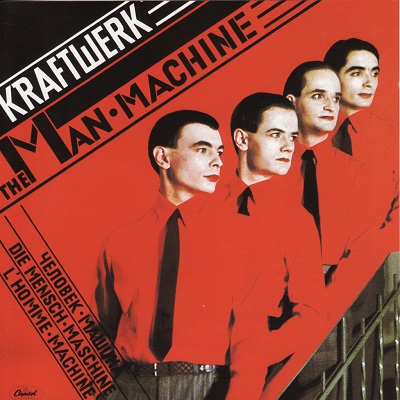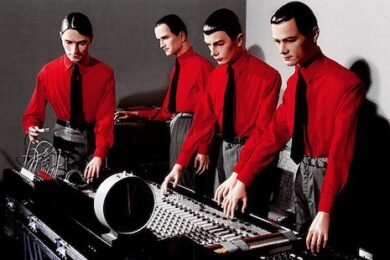4. Trevor HornThe Man-Machine

Bruce Woolley [who co-wrote ‘Video Killed The Radio Star’] played me this album. I remember we were in East Sheen. I listened to the whole thing in awe. It was techno, and that was what was so exciting about it. It was totally different. And back then I was trying to work out into a way into the music industry, but punk really wasn’t me. But this was. It’s what I was interested in anyway, because I was starting to produce records, and I’d made my first primitive drum machine in 1978. I’d used a two-inch tape to make a basic groove, speeding it up and slowing it down as I needed to. I remember when I first did it, and our drummer ranting at me. "It sounds like a fucking machine." Er, yes, that’s sort of what I’m after!
I love the sparsity of The Man-Machine. And I loved the wit of those songs. There was so much changing so quickly with technology in that period too. When the Fairlight came along, being able to sample – it was so exciting. It was on those early 80s Peter Gabriel records, and Kate Bush had one, but I was the first pop producer who really used it a lot. It cost £18,000, but it was worth every penny. It meant I was right on the edge of everything.
A few really great things came from it too. [Frankie Goes To Hollywood’s] ‘Relax’, of course – the whole backing track was a combination of a Fairlight and a drum machine. And sampling was particularly exciting because when you sampled something it turned out sounding different. Nowadays everything sounds the same, so you have to try and make things sound different! That early machine age was great. Give me an 80s record and I could probably tell you precisely what machine’s being used on everything.
And then there was ‘Two Tribes’ of course. [Horn then tolerates a long, geeky question from me about the ‘Two Tribes” 12-inch mixes, which featured the voice of Protect and Survive public information film voiceover artist Patrick Allen. Did he get him into the studio to do extra recordings?] I had to. All the stuff he said was on that secret tape every radio station had. We got a leaked version of that tape. But rather than just use the leaked version, because this guy is a voiceover artist, you know – you can’t do that. So I hired him. He cost £1,000. I didn’t give him a script until he arrived in the studio and he looked at it, and he went, "Oh my goodness, you know before I did that tape, I had to sign the Official Secrets Act". Then he said, "I shouldn’t do this", but then he said, "I’ll do it, what the hell", and he did it.
And so he went through it. Then he told us about a few things we didn’t have, like "if your mother or anybody should die in the shelter", so I kept all that on the reel-to-reel. When we did the 12 inch I kept repeating that over and over because it felt so over the top. [I say if anything scared young people about nuclear war in the 80s, it was ‘Two Tribes’.] That’s what we were trying to do.


